It’s Mothers Day weekend. Today’s playlist consists of songs about mothers. Not mothers like Shaft, a bad mother shut-your-mouth. Real mothers.
Happy Mothers Day!
Click here to like Tunes du Jour on Facebook!
Follow me on Twitter: @TunesDuJour
It’s Mothers Day weekend. Today’s playlist consists of songs about mothers. Not mothers like Shaft, a bad mother shut-your-mouth. Real mothers.
Happy Mothers Day!
Click here to like Tunes du Jour on Facebook!
Follow me on Twitter: @TunesDuJour
“I didn’t really care what Lieber and Stoller thought of my songs. They didn’t like ‘em, but Doc Pomus did. That was all right that [Lieber and Stoller] didn’t like ‘em, because I never liked their songs either. ‘Yakety yak, don’t talk back.’ ‘Charlie Brown is a clown,’ ‘Baby I’m a hog for you.’ Novelty songs. They weren’t saying anything serious.”
– Bob Dylan, February 2015
“I don’t believe you. You’re a liar!”
– Bob Dylan to an audience member who called him “Judas,” May 1966
– Glenn Schwartz to Bob Dylan regarding his disdain for Lieber and Stoller, April 2015
Perhaps Dylan doesn’t like the comical songs Lieber and Stoller wrote for The Coasters (though I’m skeptical of that as well), but how can he honestly dismiss all their work as novelty songs? Their compositions are part of the Great American Songbook – Rock & Roll Edition. “Jailhouse Rock,” “Stand by Me,” “On Broadway,” “Hound Dog,” “Kansas City,” “Spanish Harlem,” “Is That All There Is?” These aren’t humorous songs. Okay, “Is That All There Is?” is pretty funny, though that wasn’t intentional.
I think Bob made that comment as he was miffed about Lieber and Stoller dismissing his work. That they didn’t get Dylan is folly on their part, but the duo’s work has stood the test of time.
Today is the birthday of the late great Jerry Lieber. Today’s playlist consists of twenty classics from the Lieber and Stoller songbook.
Click here to like Tunes du Jour on Facebook.
Follow me on Twitter: @TunesDuJour
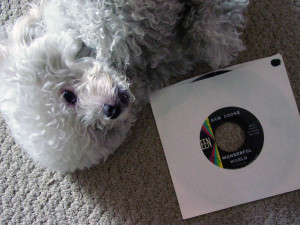
It’s that time of year when music geeks such as I think about the I.R.S. I.R.S. as in It Really Shoulda, as in it really should been a top ten hit.
Eight years ago, a colleague from my Sony Music days, Rich Appel, created the I.R.S. countdown. Music fans submitted a list of songs that didn’t make the top ten on Billboard magazine’s Hot 100 but should have, in their opinion. Rich compiled the tallies to create the overall I.R.S. top 104. He’s been compiling this survey each year since.
As for why a song should have been a top ten hit, that’s left entirely up to the list-maker. On my list, I included records that are perfect or near-perfect melodically, lyrically and/or production-wise. I included songs that have withstood the test of time and are still part of the public consciousness years later. I included records that everybody thinks were top ten hits. I included tracks that would have been top ten hits except they didn’t conform to Billboard’s rules for chart placement at their time of release (e.g. they weren’t available on commercial 7-inch singles or viral video play didn’t count in metric measurements). I included singles by artists who hit the top ten with lesser songs. I focused on tracks that have pop appeal, leaving out fantastic recordings from some of my favorite acts, such as The Replacements and The Smiths – they were called “alternative” because they weren’t pop.
My list for 2015 is below, followed by a Spotify playlist of those songs. Rich asks people submitting lists to put them in order, with #1 being the record one feels should have, more than any other, been a top ten hit. Ask me to do so tomorrow and my list will likely be in a different order.
For today, here is my I.R.S. 104. After the artist name I listed how high the song charted during its initial release. If the single hit the Hot 100 at a later date, I included that information as well.
You can hear the official I.R.S. 104 tally for 2015 on Rich Appel’s radio show, That Thing, this coming weekend on RewoundRadio.com. Friday at 6PM Eastern he’ll go from #104 to around #53 and Sunday starting at 6PM Eastern he’ll pick up from where he left off and go to #1.
1. Wonderful World – Sam Cooke (#12, 1960)
2. Ain’t No Mountain High Enough – Marvin Gaye and Tammi Terrell (#19, 1967)
3. River Deep, Mountain High – Ike and Tina Turner (#88, 1966)
4. I Only Want to Be with You – Dusty Springfield (#12, 1964)
5. Fortunate Son – Creedence Clearwater Revival (#14, 1969)
6. Cupid – Sam Cooke (#17, 1961)
7. Holiday – Madonna (#16, 1984)
8. Isn’t She Lovely – Stevie Wonder (did not chart, 1977)
9. 1999 – Prince (#44, 1982; #12, 1983; #40, 1999)
10. Born to Run – Bruce Springsteen (#23, 1975)
11. It Takes Two – Marvin Gaye and Kim Weston (#14, 1967)
12. Little Egypt (Ying Yang) – The Coasters (#23, 1961)
13. I Want to Take You Higher – Sly & the Family Stone (#60, 1969; #38, 1970)
14. Into the Groove – Madonna (did not chart, 1985)
15. We Will Rock You – Queen (did not chart, 1978; #52, 1992)
16. S.O.S. – Abba (#15, 1975)
17. You’ve Got a Friend – Carole King (did not chart, 1971)
18. Hold On! I’m Comin’ – Sam & Dave (#21, 1966)
19. Try a Little Tenderness – Otis Redding (#25, 1967)
20. The Way You Do the Things You Do – The Temptations (#11, 1964)
21. It’s a Shame – Spinners (#14, 1970)
22. It’s Gonna Work Out Fine – Ike & Tina Turner (#14, 1961)
23. Under My Thumb – the Rolling Stones (did not chart, 1966)
24. Opus 17 (Don’t You Worry ‘Bout Me) – Four Seasons (#13, 1966)
25. Me and Julio down by the School Yard – Paul Simon (#22, 1972)
26. Happy Xmas (War Is Over) – John & Yoko & the Plastic Ono Band with the Harlem Community Choir (did not chart, 1971)
27. I’m Every Woman – Chaka Khan (#21, 1978)
28. Viva Las Vegas – Elvis Presley (#29, 1964)
29. Do They Know It’s Christmas? – Band Aid (#13, 1984)
30. Super Freak – Rick James (#16, 1981)
31. Mighty Love – Spinners (#20, 1974)
32. Stan – Eminem featuring Dido (#51, 2000)
33. So Far Away – Carole King (#14, 1971)
34. Christmas (Baby Please Come Home) – Darlene Love (did not chart, 1963)
35. Because the Night – Patti Smith Group (#13, 1978)
36. Big Yellow Taxi – Joni Mitchell (#67, 1970)
37. Candy Girl – New Edition (#46, 1983)
38. Brass in Pocket (I’m Special) – Pretenders (#14, 1980)
39. Everybody Hurts – R.E.M. (#29, 1993)
40. It Takes Two – Rob Base & DJ E-Z Rock (#36, 1988)
41. Heartbreak Hotel – the Jacksons (#22, 1981)
42. Young Hearts Run Free – Candi Staton (#20, 1976)
43. Valerie – Mark Ronson featuring Amy Winehouse (did not chart, 2007)
44. Rock and Roll All Nite (live) – Kiss (#12, 1976)
45. You Make Me Feel (Mighty Real) – Sylvester (#36, 1979)
46. L-O-V-E (Love) – Al Green (#13, 1975)
47. It’s Raining Men – the Weather Girls (#46, 1983)
48. I’m a Slave 4 U – Britney Spears (#27, 2001)
49. You Shook Me All Night Long – AC/DC (#35, 1980)
50. Wake Up Everybody – Harold Melvin and the Blue Notes (#12, 1976)
51. Walk on the Wild Side – Lou Reed (#16, 1973)
52. Bring It on Home to Me – Sam Cooke (#13, 1962)
53. Pride (In the Name of Love) – U2 (#33, 1984)
54. Ain’t No Stoppin’ Us Now – McFadden & Whitehead (#13, 1979)
55. Move Your Feet – Junior Senior (did not chart, 2003)
56. Heroes – David Bowie (did not chart, 1977)
57. Werewolves of London – Warren Zevon (#21, 1978)
58. One Way or Another – Blondie (#24, 1979)
59. You Get What You Give – New Radicals (#36, 1999)
60. Heaven Must Be Missing an Angel – Tavares (#15, 1976)
61. Ain’t Nobody – Rufus featuring Chaka Khan (#22, 1983)
62. You Can Call Me Al – Paul Simon (#44, 1986, #23, 1987)
63. I Can’t Make You Love Me – Bonnie Raitt (#18, 1992)
64. Young Americans – David Bowie (#28, 1975)
65. A Change Is Gonna Come – Sam Cooke (#31, 1965)
66. Respect Yourself – the Staple Singers (#12, 1971)
67. Moondance – Van Morrison (did not chart, 1970; #92, 1977)
68. Where’s the Love – Hanson (did not chart, 1997)
69. Don’t You Worry ‘Bout a Thing – Stevie Wonder (#16, 1974)
70. I Want Candy – Bow Wow Wow (#62, 1982)
71. Genius of Love – Tom Tom Club (#31, 1982)
72. Beautiful Stranger – Madonna (#19, 1999)
73. Shame, Shame, Shame – Shirley (& Company) (#12, 1975)
74. The Way I Am – Eminem (#58, 2000)
75. Jungle Love – The Time (#20, 1985)
76. Gypsy – Fleetwood Mac (#12, 1982)
77. Smile – Lily Allen (#49, 2007)
78. Tear the Roof off the Sucker (Give up the Funk) – Parliament (#15, 1976)
79. Same Love – Macklemore & Ryan Lewis featuring Mary Lambert (#11, 2013)
80. Solid – Ashford & Simpson (#12, 1985)
81. Rapper’s Delight – The Sugarhill Gang (#36, 1980)
82. The Cup of Life – Ricky Martin (#60, 1998; #45, 1999)
83. Me, Myself and I – De La Soul (#34, 1989)
84. Bad Luck – Harold Melvin & the Blue Notes (#15, 1975)
85. Once in a Lifetime – Talking Heads (did not chart, 1981)
86. Fuck You – Lily Allen (#68, 2009)
87. Such Great Heights – The Postal Service (did not chart, 2003)
88. Can’t Take My Eyes Off You (movie version) – Lauryn Hill (did not chart, 1998)
89. Dedication to My Ex (Miss That) – Lloyd featuring Andre 3000 (#79, 2011)
90. Jump To It – Aretha Franklin (#24, 1982)
91. Mamma Mia – Abba (#32, 1976)
92. Space Oddity – David Bowie (did not chart, 1969; #15, 1973)
93. P Control – O{+> (Prince) (did not chart, 1995)
94. Got Your Money – Ol’ Dirty Bastard featuring Kelis (#33, 1999)
95. LDN – Lily Allen (did not chart, 2007)
96. It Doesn’t Matter Anymore – Buddy Holly (#13, 1959)
97. Does Your Mother Know – Abba (#19, 1979)
98. Up in a Puff of Smoke – Polly Brown (#16, 1975)
99. Blue Limousine – Apollonia 6 (did not chart, 1984)
100. All the Young Dudes – Mott the Hoople (#37, 1972)
101. Fight the Power – Public Enemy (did not chart, 1989)
102. Pass That Dutch – Missy Elliott (#27, 2003)
103. Stacy’s Mom – Fountains of Wayne (#21, 2003)
104. You Know I’m No Good – Amy Winehouse (#78, 2007; #77, 2008)
Click here to like Tunes du Jour on Facebook!
Follow me on Twitter: @TunesDuJour
Trivia Question – Who is the only male solo artist whose first eight singles all went top ten in the UK?
Elton John? No. Elvis Presley? No. Cliff Richard? No. It was Rick Astley. In the US many people remember Rick as a one-hit wonder, but that is incorrect. Rick had seven top 40 singles stateside, including five top tens, two of which, “Never Gonna Give You Up” and “Together Forever,” went to #1. He retired from recording in 1993, by which time he had sold around forty million records.
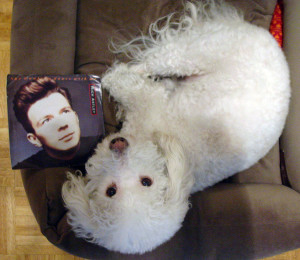
Today Rick turns 49 years old. We kick off our weekly dance party with a largely-forgotten tune of his that went top ten on both sides of the Atlantic.
Click here to like Tunes du Jour on Facebook!
Follow me on Twitter: @TunesDuJour
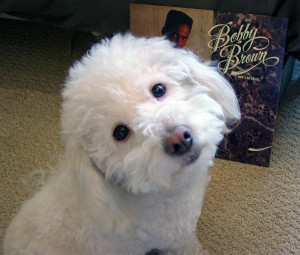
Today is Bobby Brown’s 46th birthday. A former member of New Edition, Brown had his first solo hit in 1988 with “Don’t Be Cruel,” which reached #8 on the Hot 100. Though it shares its title with an Elvis Presley #1 hit from 1956, Brown’s “Don’t Be Cruel” is not a remake.
That brings us to today’s playlist, which I call The Song Retains the Name. It consists of different songs with the same title. I initially planned to include twenty such songs, but more kept springing to mind. Before I knew it, I passed 100 entries. There are plenty more, so I decided to open this up to my reader(s). If you have songs that share titles you’d like to add, feel free to do so.
(NOTES: I included The Jacksons’ “This Place Hotel” because when it was released in 1980 its title was “Heartbreak Hotel.” Thought he didn’t have to, Michael Jackson, the song’s writer, later changed its name to “This Place Hotel” to avoid confusion with the Elvis Presley song “Heartbreak Hotel.” Whitney Houston didn’t feel the need to make the same Hotel accommodation.
Also, though it is listed on Spotify as “The Best of My Love,” the Eagles track does not have a “The” on the 45 or the band’s On the Border album.)
Click here to follow Tunes du Jour on Facebook!
Follow me on Twitter: @TunesDuJour
As you may have heard, our sleepy little hamlet of Los Angeles got some rain over the past week. I assume you heard this because Los Angeles is the center of the world and our weather is likely reported everywhere, especially when we get rain, which lesser cities take for granted. More rain is forecast for this week.
If you were near a radio in the United States in 1972, you heard Albert Hammond’s hit single “It Never Rains in Southern California,” and learned that while in L.A. it never rains, it pours. Man, it pours.
Today’s playlist consists of songs with word rain or some variation thereof in the title. It includes Albert Hammond’s “It Never Rains in Southern California,” one of two top forty singles Hammond had as an artist. (The other was 1974’s “I’m a Train.” Remember that one? Didn’t think so.) As a songwriter, Hammond’s hits include The Hollies’ “The Air That I Breathe,” Leo Sayer’s “When I Need You,” Starship’s “Nothing’s Gonna Stop Us Now,” Whitney Houston’s “One Moment in Time,” Chicago’s “I Don’t Wanna Live Without Your Love,” Ace of Base’s “Don’t Turn Around,” Julio Iglesias and Willie Nelson’s “To All the Girls I’ve Loved Before” and The Pipkins’ “Gimme Dat Ding.” His son is a founding member of The Strokes.
Back to the weather. Get your umbrella and enjoy today’s playlist while the sun is still shining.
In 1958, 13-year-old Brenda Mae Tarpley went into a recording studio with famed producer Owen Bradley and cut “Rockin’ around the Christmas Tree,” written by Johnny Marks (Jew!). Released as a single for that year’s holiday season, it bombed. That really isn’t surprising. Tarpley, better known by her stage name, Brenda Lee, was virtually unknown at the time.
In 1959, her record label reissued the single. It bombed. That really isn’t surprising. Lee hadn’t dented Billboard’s Hot 100 all year.
In 1960, her record company released it yet again. Third time lucky. Coming off two #1 singles, “I’m Sorry” and “I Want to Be Wanted,” plus two other top ten hits, “Sweet Nothin’s” and “That’s All You Gotta Do,” Lee’s Christmas record peaked at #14.
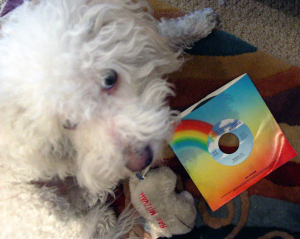
For years the hits kept coming for Lee. She placed 55 songs on Billboard’s Hot 100, including twelve top tens. These days she is perhaps best-remembered for “Rockin’ around the Christmas Tree,” a holiday staple.
Johnny Marks, the Jew who wrote the song, also wrote “Rudolph, the Red-Nosed Reindeer,” “Holly Jolly Christmas,” and “Run Rudolph Run.”
He’s not the only Jew to have written Christmas standards. Also written by chosen people? “White Christmas,” “Silver Bells,” “Winter Wonderland,” “Santa Baby,” “Sleigh Ride,” “I’ll Be Home for Christmas,” Let It Snow Let It Snow Let It Snow,” “The Christmas Song (Chestnuts Roasting on an Open Fire),” “You’re a Mean One, Mr. Grinch,” “It’s the Most Wonderful Time of the Year,” and “Give the Jew Girl Toys.” Oy gevalt!
Today Brenda Lee turns 70 years old. Our playlist today includes her classic version of “Rockin’ around the Christmas Tree” as well as nineteen other holiday tunes from the early days of rock and roll, before The Beatles took over the United States in 1964. Some were written by Jews, some were not. Some get a lot of radio airplay this time of year, some deserve more (specifically “Christmas in Jail” and “Trim Your Tree.”). All put me in the mood to rock around my menorah.
More holiday music can be found here, here, here, here, and here.
Click here to like Tunes du Jour on Facebook!
In 2008 Rolling Stone published their list of the 100 Greatest Singers of All-Time. At #1 was Aretha Franklin. No argument here. She has a voice and she knows how to use it effectively. Her range, her passion, her vocal variety, her phrasing, her confidence and her power are what other artists should aspire to replicate. When you hear Aretha Franklin, you know it’s her, even if you’ve never heard that particular recording before.
The rest of the top ten included Ray Charles, Elvis Presley, Sam Cooke, John Lennon, Marvin Gaye, Otis Redding, Stevie Wonder, James Brown and Bob Dylan. I’ve heard people argue against that last one. They’re wrong. Dylan may not possess a stereotypically beautiful voice, but he is a great singer. Nobody else sounds like him. When you hear Bob Dylan, you know it’s him, even if you’ve never heard that particular recording before.
Missing from this 100 Greatest list is Mrs. Miller. Born Elva Connes in 1907, she became Mrs. Miller in 1934 when she married a Mr. Miller. In 1966, Capitol Records released her major label debut, Mrs. Miller’s Greatest Hits. Like Aretha, Mrs. displayed passion, power and confidence in her material. When you hear Mrs. Miller, you know it’s her, even if you’ve never heard that particular recording before, which chances are you haven’t.
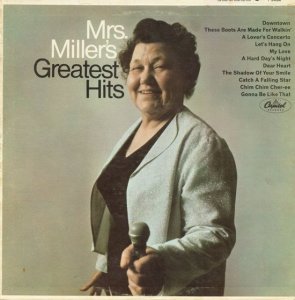
All the qualities that make Mrs. Miller unique can be heard on her first charting single, a cover of Petula Clark’s “Downtown,” which reached #82 on Billboard’s Hot 100. Her vibrato, her soaring soprano, the way she sings “always” in the song’s first line, the way she sings ahead of the beat on the line “no finer place for sure” in the first go-round of the chorus, the way she sings ahead of the beat on the first line of the second verse, the way she sings ahead of the beat on the bridge after the third verse, when she laughs while singing “waiting for you tonight” in the second go-round of the chorus. And then there’s her whistling solo. In a word, wow!
As was often the case with The Beatles, Elvis Presley and Creedence Clearwater Revival, the b-side of the “Downtown” single, Mrs.’ version of The Toys’ “A Lover’s Concerto,” also made Billboard’s Hot 100, peaking at #95. Again we’re transfixed by her vibrato, her hitting notes that had never been written and the way she sings ahead of the beat on the final verse. And then there’s her scatting like Ella Fitzgerald. Well, maybe not like Ella Fitzgerald. In a word, wow!
Her voice leant itself equally well to rock and roll, pop, country, and show tunes. She probably would have mastered rap as well. On her cover of Chuck Berry’s “Memphis,” she ditches her usual soprano to speak the words in a lower register. Her whistling solo is in its usual range, however.
Mrs. Miller’s Greatest Hits sold 250,000 copies in its first three weeks of release. She made television appearances on The Tonight Show with Johnny Carson and Ed Sullivan. She sang at The Hollywood Bowl. She performed alongside Bob Hope for US troops in Vietnam. That she is all but forgotten today is a shonda.
Rolling Stone’s list of The 100 Greatest Singers Of All-Time is terrific, but someone should be bumped (cough cough Mariah Carey cough cough) to make room for Mrs. Miller. Her distinctive sound, her enthusiasm and her ability to transform any song into a Mrs. Miller song make her one of the greats. The fact that she didn’t have her first chart single until age 58 inspires me.
If Mrs. Miller were still alive she’d be celebrating her 107th birthday today. She isn’t so she won’t be, but Tunes du Jour celebrates her craft with ten of her finest.
Click here to like Tunes du Jour on Facebook!
The Tony Awards, celebrating excellence on the Broadway stages, are being presented this evening. The Tony Awards are like the gay version of the Tony Awards. That’s how gay they are.
Last year I took second place in a speech contest where I spoke about the effect Broadway had on my life. Here is that speech, followed by a playlist consisting of cover versions of Broadway classics.
I lost track of what day it was and in doing so missed posting about George Harrison’s birthday, which was yesterday.
The Beatles are my favorite recoding act of all-time, and if I had to rank the group’s members in order, George would make the top four (no disrespect to Pete Best).
I’d been thinking about what to post for George’s birthday for a couple of weeks. His recordings are not on Spotify, the program I use to create the playlists in each blog entry. I couldn’t find any worthwhile vintage performance clips of George on YouTube. I could post the music video for “Got My Mind Set on You,” but that track is hardly representative of the man’s genius. I was leaning toward creating a playlist of great covers of George’s songs, but what I came up with before abandoning that idea was an unremarkable collection that would not serve as a fitting tribute.
I love so many of his songs – “My Sweet Lord,” “Handle With Care” (Traveling Wilburys), “The Inner Light” (The Beatles), “What Is Life,” “All Those Years Ago,” “It Don’t Come Easy” (written by George and Ringo Starr, recorded by Ringo), “Something” (The Beatles), “Here Comes the Sun” (The Beatles), “While My Guitar Gently Weeps” (The Beatles), “If Not For You,” and “When We Was Fab” at the forefront, though my favorite of George’s solo recordings is “Give Me Love (Give Me Peace on Earth).” In his autobiography George wrote “This song is a prayer and personal statement between me, the Lord, and whoever likes it.” The Lord and I aren’t on speaking terms; however, I love the song’s message. I’m a sucker for songs espousing love for all. “Put a Little Love in Your Heart?” Yes! “Love Train?” Hell, yeah! The Black Eyed Peas’ “Where Is the Love?” Sure, even though it includes the lyric “to discriminate only generates hate / And when you hate then you’re bound to get irate, yeah / Badness is what you demonstrate.” And then you won’t be able to meet a mate named Nate / You won’t even get a date / To gain weight will be your fate / You won’t make it through the gate and then you’ll be late / That isn’t great.” And that’s why I adore George’s “Give Me Love.”
![]()
Today marks the birthday of two other all-time favorites of mine – Johnny Cash and Fats Domino. I’ve created a playlist for each of them.
The Johnny Cash playlist kicks off with his 1963 hit “Ring of Fire.” The writing of the song is credited to June Carter, who married Johnny in 1968, and Merle Kilgore. Though initially recorded by Carter’s sister Anita, Carter said the song was inspired by Cash, who at that time was her friend and singing partner. Though not romantically-involved, she was drawn to him against her better judgment, despite his drug use. Per June, there is “no way to extinguish a flame that burns, burns, burns.”
Cash’s wife at that time, Vivian Liberto, claimed that June had nothing to do with writing that song. Per Liberto, Johnny wrote it “while pilled up and drunk” and it’s not about the love June described, but rather it’s “about a certain private female body part,” which provides a much different image to accompany the line “I went down, down, down.” I’m not an expert on this body part to which Liberto refers, but if it burns, burns, burns, you should probably have it checked out by a professional. Anyway, Liberto said Cash gave Carter the writing credit because she needed the money.
![]()
Our Fats Domino playlist kicks off with one of Richie Cunningham’s favorites, “Blueberry Hill.” Though Domino wrote many of his hits, this one was written by Vincent Rose, Larry Stock and Al Lewis (not the Grandpa Munster Al Lewis) in 1940.
Domino recorded this song at a session after he ran out of material. His long-time producer, Dave Bartholomew, was against doing the song, perhaps because all of Fat’s hits up to that point had been original compositions. Domino’s version hit #2 in 1957 and has become one of his most recognizable recordings.
Some other facts about Fats: In the fifties he sold more records than any other rock & roll artist except Elvis Presley; he’s had 35 US top 40 pop hits; his song “The Fat Man,” from 1949, is considered by many to be the first rock and roll record; today he turns 86.